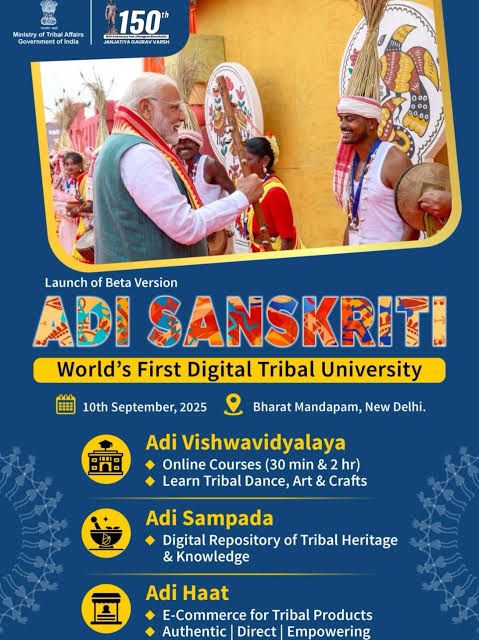 Image Source: Instagram
Image Source: Instagram
In a landmark move to safeguard indigenous knowledge and promote inclusive education, India has launched the beta version of Adi Sanskriti, the world’s first digital tribal university. Spearheaded by the Ministry of Tribal Affairs, this pioneering initiative was unveiled on September 10, 2025, by Union Minister of State for Tribal Affairs Durgadas Uikey at Bharat Mandapam, New Delhi, during the National Conference on Adi Karmayogi Abhiyan.
Adi Sanskriti is more than just a digital learning platform—it is a holistic ecosystem designed to preserve tribal art, culture, and livelihoods while connecting tribal communities to national and global audiences. The platform integrates education, cultural documentation, and e-commerce, marking a transformative step in India’s tribal empowerment journey.
Key Highlights of Adi Sanskriti
Launched as the world’s first digital university dedicated to tribal heritage
Offers 45 immersive online courses on tribal dance, crafts, music, and folklore
Hosts over 5,000 curated documents on tribal art, textiles, and livelihood practices
Includes an online marketplace linked with TRIFED to promote tribal products
Developed in collaboration with Tribal Research Institutes from 15 states
Three Pillars of the Platform
Adi Vishwavidyalaya This digital academy offers structured courses on tribal knowledge systems. Learners can explore traditional dance forms, indigenous crafts, musical traditions, and oral folklore. The curriculum is designed to be immersive and accessible, with plans to expand into certification and advanced research programs.
Adi Sampada Serving as a socio-cultural repository, Adi Sampada houses thousands of documents, images, and multimedia content that chronicle tribal heritage. Themes include paintings, textiles, artifacts, and livelihood practices. The repository is curated with contributions from Tribal Research Institutes across states such as Andhra Pradesh, Assam, Chhattisgarh, Gujarat, Kerala, Madhya Pradesh, Maharashtra, Odisha, Rajasthan, Tamil Nadu, Telangana, and Uttar Pradesh.
Adi Haat This digital marketplace connects tribal artisans directly with consumers. Linked with TRIFED, Adi Haat enables the sale of handcrafted goods, textiles, and organic products, creating sustainable income opportunities for tribal communities. The platform aims to evolve into a dedicated e-commerce hub for tribal entrepreneurship.
Empowering Through Technology and Tradition
Adi Sanskriti builds on earlier initiatives like Adi Vaani, an AI-based translator for tribal languages such as Gondi, Bhili, Santali, and Mundari. These tools are designed to bridge linguistic gaps and promote digital inclusion. The university’s launch aligns with the government’s Viksit Bharat @2047 vision, which emphasizes inclusive development and cultural preservation.
Minister Durgadas Uikey emphasized that Adi Sanskriti is not just about education—it is about dignity, empowerment, and opportunity. By digitizing tribal knowledge and creating pathways for economic participation, the platform seeks to uplift Scheduled Tribes and integrate their contributions into India’s broader development narrative.
Future Roadmap
Expansion into full-fledged certification programs and research fellowships
Integration of more tribal languages and regional dialects into the platform
Enhanced collaboration with academic institutions and cultural bodies
Development of mobile applications for wider accessibility
Conclusion
Adi Sanskriti represents a bold and visionary leap in India’s efforts to preserve its tribal heritage while empowering communities through education and enterprise. By combining tradition with technology, the platform sets a global precedent for how indigenous knowledge can be honored, shared, and sustained in the digital age. As it evolves, Adi Sanskriti promises to be a beacon of cultural resilience and inclusive growth.
Sources: ThePrint, The Hindu, NewsOnAir
Advertisement
Advertisement





